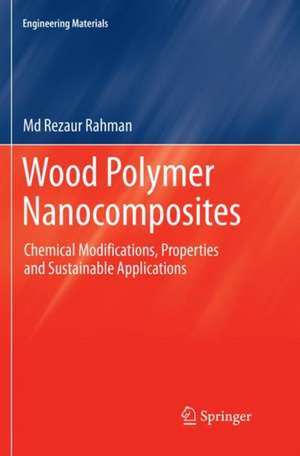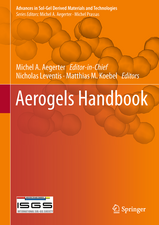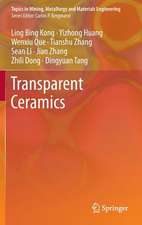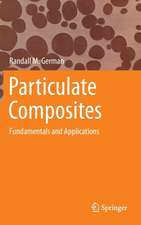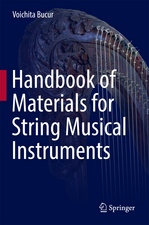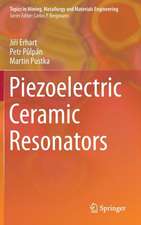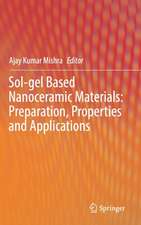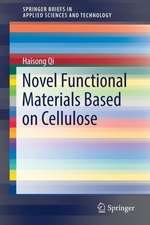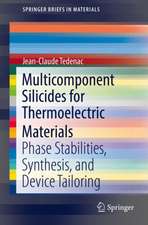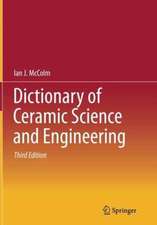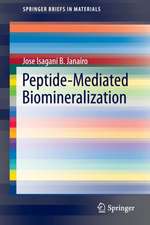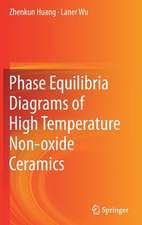Wood Polymer Nanocomposites: Chemical Modifications, Properties and Sustainable Applications: Engineering Materials
Autor Md Rezaur Rahmanen Limba Engleză Paperback – 15 aug 2018
| Toate formatele și edițiile | Preț | Express |
|---|---|---|
| Paperback (1) | 786.29 lei 38-44 zile | |
| Springer International Publishing – 15 aug 2018 | 786.29 lei 38-44 zile | |
| Hardback (1) | 952.26 lei 6-8 săpt. | |
| Springer International Publishing – 15 sep 2017 | 952.26 lei 6-8 săpt. |
Din seria Engineering Materials
- 18%
 Preț: 1390.89 lei
Preț: 1390.89 lei - 18%
 Preț: 1236.99 lei
Preț: 1236.99 lei - 24%
 Preț: 829.34 lei
Preț: 829.34 lei - 18%
 Preț: 1001.02 lei
Preț: 1001.02 lei - 20%
 Preț: 573.70 lei
Preț: 573.70 lei - 17%
 Preț: 490.22 lei
Preț: 490.22 lei - 18%
 Preț: 891.33 lei
Preț: 891.33 lei - 15%
 Preț: 644.95 lei
Preț: 644.95 lei - 18%
 Preț: 892.90 lei
Preț: 892.90 lei - 18%
 Preț: 1384.75 lei
Preț: 1384.75 lei - 18%
 Preț: 1002.61 lei
Preț: 1002.61 lei -
 Preț: 343.98 lei
Preț: 343.98 lei - 18%
 Preț: 997.09 lei
Preț: 997.09 lei - 18%
 Preț: 1106.00 lei
Preț: 1106.00 lei - 18%
 Preț: 1120.99 lei
Preț: 1120.99 lei - 15%
 Preț: 703.85 lei
Preț: 703.85 lei - 15%
 Preț: 658.05 lei
Preț: 658.05 lei - 18%
 Preț: 889.75 lei
Preț: 889.75 lei - 18%
 Preț: 946.55 lei
Preț: 946.55 lei - 18%
 Preț: 1396.43 lei
Preț: 1396.43 lei - 18%
 Preț: 1101.26 lei
Preț: 1101.26 lei - 17%
 Preț: 428.09 lei
Preț: 428.09 lei - 18%
 Preț: 1111.85 lei
Preț: 1111.85 lei - 18%
 Preț: 1588.67 lei
Preț: 1588.67 lei -
 Preț: 388.44 lei
Preț: 388.44 lei - 20%
 Preț: 566.85 lei
Preț: 566.85 lei - 18%
 Preț: 949.42 lei
Preț: 949.42 lei - 15%
 Preț: 631.72 lei
Preț: 631.72 lei - 15%
 Preț: 640.88 lei
Preț: 640.88 lei - 15%
 Preț: 635.47 lei
Preț: 635.47 lei - 18%
 Preț: 1233.20 lei
Preț: 1233.20 lei - 18%
 Preț: 1548.11 lei
Preț: 1548.11 lei - 18%
 Preț: 1126.03 lei
Preț: 1126.03 lei - 15%
 Preț: 638.11 lei
Preț: 638.11 lei - 15%
 Preț: 637.46 lei
Preț: 637.46 lei - 18%
 Preț: 1217.10 lei
Preț: 1217.10 lei - 18%
 Preț: 945.62 lei
Preț: 945.62 lei - 18%
 Preț: 948.61 lei
Preț: 948.61 lei - 18%
 Preț: 1224.54 lei
Preț: 1224.54 lei -
 Preț: 367.93 lei
Preț: 367.93 lei - 15%
 Preț: 639.25 lei
Preț: 639.25 lei - 15%
 Preț: 643.34 lei
Preț: 643.34 lei - 18%
 Preț: 955.08 lei
Preț: 955.08 lei - 15%
 Preț: 645.79 lei
Preț: 645.79 lei - 18%
 Preț: 1237.30 lei
Preț: 1237.30 lei - 18%
 Preț: 1114.34 lei
Preț: 1114.34 lei - 18%
 Preț: 1217.10 lei
Preț: 1217.10 lei
Preț: 786.29 lei
Preț vechi: 1034.60 lei
-24% Nou
Puncte Express: 1179
Preț estimativ în valută:
150.45€ • 157.09$ • 124.52£
150.45€ • 157.09$ • 124.52£
Carte tipărită la comandă
Livrare economică 01-07 aprilie
Preluare comenzi: 021 569.72.76
Specificații
ISBN-13: 9783319880945
ISBN-10: 3319880942
Pagini: 314
Ilustrații: XV, 314 p. 153 illus., 49 illus. in color.
Dimensiuni: 155 x 235 mm
Ediția:Softcover reprint of the original 1st ed. 2018
Editura: Springer International Publishing
Colecția Springer
Seria Engineering Materials
Locul publicării:Cham, Switzerland
ISBN-10: 3319880942
Pagini: 314
Ilustrații: XV, 314 p. 153 illus., 49 illus. in color.
Dimensiuni: 155 x 235 mm
Ediția:Softcover reprint of the original 1st ed. 2018
Editura: Springer International Publishing
Colecția Springer
Seria Engineering Materials
Locul publicării:Cham, Switzerland
Cuprins
Introduction and reinforcing potential various clay and monomers dispersed wood nanocomposites.- Preparation and characterizations of various clay and monomers dispersed wood nanocomposites.- Combined styrene/MMA/nanoclay cross-linker effect on wood-polymer nanocomposites.- Oxidation of wood species by sodium meta periodate and impregnation with phenyl hydrazine.- Characterization of N, N dimethylacetamid impregnated wood polymer nanocomposites.- Mechanical and thermal characterization of urea formaldehyde impregnated wood polymer nanocomposites.- Characterization of epoxy/nanoclay/wood polymer nanocomposites.- Influence of nanoclay/phenol formaldehyde resin on wood polymer nanocomposites.- Clay dispersed styrene-co-glycidyl methacrylate impregnated wood polymer nanocomposites: Impact on mechanical and morphological properties.- Physico-mechanical, morphological and thermal properties of clay dispersed styrene-co-maleic acid impregnated wood polymer nanocomposites.- Preparation andcharacterizations of clay dispersed styrene-co-ethylene glycol dimethyl acrylate impregnated wood polymer nanocomposites.- Evaluation of clay dispersed styrene-co-3-trimethyl silyl propyl methacrylate impregnated wood polymer nanocomposites on physical, mechanical, thermal and morphological properties.- Investigations on the physico-mechanical, thermal and morphological properties of nanoclay dispersed acrylonitrile-co-butyl methacrylate wood polymer nanocomposites.- Studies on the physical, mechanical, thermal and morphological properties of impregnated furfuryl alcohol-co-glycidyl methacrylate/nanoclay wood polymer nanocomposites.- Nanoclay dispersed furfuryl alcohol-co-ethyl methacrylate wood polymer nanocomposites: The enhancement on physico-mechanical and thermal properties.- Sustainable application of various monomer/clay dispersed wood polymer nanocomposites.
Notă biografică
Md Rezaur Rahman is a Senior Lecturer (Assistant Professor) at the Department of Chemical Engineering and Energy Sustainability, Faculty of Engineering, Universiti Malaysia Sarawak (UNIMAS), Malaysia and also Visiting research fellow at Faculty of Engineering, Tokushima University, Japan since June 2012. His research interests include, among others, conducting polymers, Polymer Nanocomposites, Nanocellulose (cellulose nanocrystals and nanofibrillar), and Polymer blends.
Caracteristici
Presents clay dispersed monomer as the outstanding reinforcing potential Establishes the suitable chemical modifications, properties and applications of wood polymer nanocomposites Offers a beneficial reference and technical guide for wood polymer nanocomposite materials in R & D sectors, university academics and industrial professionals Includes supplementary material: sn.pub/extras
